
Metode Science Studies Journal
Scope & Guideline
Exploring the Intersections of Knowledge and Inquiry
Introduction
Aims and Scopes
- Interdisciplinary Research:
The journal fosters research that crosses traditional disciplinary boundaries, encouraging contributions that integrate perspectives from biology, sociology, anthropology, and the arts. - Cultural Context of Science:
A core focus is on how cultural narratives and historical contexts shape scientific knowledge and communication, examining topics such as storytelling in science and the influence of societal factors on scientific development. - Evolutionary Perspectives:
The journal explores evolutionary themes in various contexts, including human origins, primate behavior, and the implications of evolutionary biology for understanding contemporary issues. - Environmental and Ecological Studies:
Research on environmental challenges, conservation efforts, and biodiversity is prevalent, reflecting a commitment to addressing pressing ecological issues through scientific inquiry. - Public Engagement and Citizen Science:
The journal promotes the involvement of the public in scientific processes, highlighting citizen science initiatives and the importance of science communication in fostering public understanding of science.
Trending and Emerging
- Science Communication and Storytelling:
There is a growing emphasis on innovative methods of communicating science, particularly through storytelling and visual media, reflecting a recognition of the importance of engaging diverse audiences. - Interconnections Between Health and Environment:
Recent articles highlight the relationship between environmental changes and health outcomes, particularly in the context of climate change and zoonotic diseases, indicating an increasing focus on the One Health approach. - Cultural Perspectives on Science:
Emerging themes explore the cultural implications of scientific narratives, such as the impact of biblical stories on scientific understanding, showcasing a trend toward integrating philosophy and ethics into scientific discussions. - Citizen Science and Public Engagement:
There is an upward trend in topics related to citizen science, emphasizing the role of community involvement in scientific research and the importance of fostering scientific literacy among the public. - Adaptation to Climate Change:
Research addressing the adaptive strategies to climate change, including studies on agricultural practices and biodiversity conservation, reflects a growing urgency to tackle environmental issues through scientific inquiry.
Declining or Waning
- Traditional Scientific Methodologies:
There seems to be a decreasing emphasis on conventional experimental methodologies in favor of more interdisciplinary and narrative-driven approaches, reflecting a broader trend towards qualitative research. - Narrowly Focused Biological Studies:
Previously, there was a stronger focus on specific biological studies, such as detailed examinations of particular species or ecosystems. This is waning as the journal shifts towards broader themes that integrate cultural and social elements. - Historical Scientific Narratives:
While historical perspectives on science remain relevant, there is a noticeable reduction in papers solely dedicated to historical analysis, indicating a shift towards contemporary issues and their implications.
Similar Journals
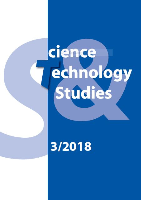
Science and Technology Studies
Advancing Knowledge Through Open Access ResearchScience and Technology Studies, an esteemed journal published by the Finnish Society for Social Science & Technology Studies, is a leading platform in the fields of History and Philosophy of Science, as well as Multidisciplinary studies. Since transitioning to an Open Access model in 2012, the journal has been committed to disseminating high-quality research accessible to a global audience, fostering international discourse and collaboration. With an impressive Scopus ranking placing it in the top 10th percentile (Rank #22 out of 223) within its categories, it showcases pioneering research and critical analyses that illuminate the complex interplay between science and societal dynamics. Located in Tampere, Finland, the journal serves as an essential resource for researchers, professionals, and students alike, aiming to advance understanding and innovation in science and technology studies through interdisciplinary engagement.

CENTAURUS
Bridging Scientific Innovation and Philosophical ReflectionCENTAURUS is a prestigious journal dedicated to the History and Philosophy of Science, published by BREPOLS PUBL in the United States. With a storied history dating back to its inception in 1950, CENTAURUS has consistently provided a platform for critical engagement and scholarly discourse in the realm of scientific development and its philosophical implications. Recognized for its academic rigor, the journal holds a commendable Q2 ranking in the History and Philosophy of Science category for 2023, reflecting its substantial contribution to the field, as evidenced by its ranking in the top 11% of 223 journals in Scopus. Although it operates on a subscription-based model, the journal is a vital resource for researchers, professionals, and students seeking insightful analyses and discussions on the interplay between science and its philosophical dimensions. Published from Turnhout, Belgium, CENTAURUS continues to shape the landscape of scientific thought with its well-curated articles that examine over a decade's worth of scholarly contributions.

Nuncius-Journal of the History of Science
Charting the Evolution of Science Through TimeNuncius - Journal of the History of Science, published by BRILL, is a vital resource dedicated to the exploration and analysis of the intricate relationship between science and its historical context. Established with the goal of fostering scholarly discussion, this journal serves as a platform for researchers and historians to present their findings and interpretations regarding the evolution of scientific thought. With an impact factor reflective of its academic rigor and ranked in the Q3 category in the field of History and Philosophy of Science, it offers a rich archive of articles spanning converged years from 1986 to 2024. Nuncius encourages submissions that advance the understanding of science's impact on society, culture, and its philosophical underpinnings, making it a key reference for those engaged in the histories that define modern scientific inquiry. Situated in the scholarly landscape of the Netherlands, Nuncius remains an essential read for professionals, students, and academics seeking to deepen their knowledge in this significant field.

Prometeica-Revista de Filosofia y Ciencias
Illuminating the Intersections of Thought and DiscoveryPrometeica-Revista de Filosofia y Ciencias, published by LUCAS EMMANUEL MISSERI in Argentina, serves as a pivotal platform in the realms of philosophy and the history of science since its establishment in 2010 as an Open Access journal. With an ISSN and E-ISSN of 1852-9488, this journal not only emphasizes accessibility but also engages a diverse audience encompassing researchers, professionals, and students eager to explore the intersections of philosophical inquiry and scientific understanding. As of 2023, Prometeica boasts a commendable Q2 ranking in Philosophy and a Q3 ranking in the History and Philosophy of Science, reflecting its growing influence in academic discourse. Despite its rising status, with Scopus rankings indicating a niche yet dedicated readership, the journal remains committed to fostering innovative dialogue and critical thought in the philosophical community. This strategically positioned journal invites contributions that not only advance theoretical perspectives but also address contemporary issues within the philosophical and scientific domains, ensuring relevance and impact for its readers.

Momona Ethiopian Journal of Science
Fostering Innovation in Natural and Computational SciencesMomona Ethiopian Journal of Science is a distinguished open-access journal that has been fostering scholarly communication in the realm of natural and computational sciences since its inception in 2009. Published by the Mekelle University, College of Natural and Computational Sciences, this journal provides a platform for researchers, professionals, and students to disseminate their findings, share innovative ideas, and engage with cutting-edge developments within the field. With its ISSN 2073-073X, the journal aims to enhance scientific discourse by welcoming high-quality manuscripts that address a variety of topics relevant to the Ethiopian and broader scientific communities. Although specific metrics like HIndex and Scopus rankings are currently unavailable, Momona’s commitment to open access ensures that its content is readily accessible, promoting a collaborative atmosphere conducive to research advancement. Located in Mekelle, Ethiopia, this journal not only contributes to local knowledge production but also aligns with global academic trends that emphasize accessibility and interdisciplinary collaboration.
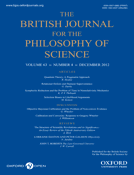
BRITISH JOURNAL FOR THE PHILOSOPHY OF SCIENCE
Cultivating a Deeper Understanding of Scientific PracticesThe British Journal for the Philosophy of Science, published by University of Chicago Press, stands as a leading journal in the fields of philosophy and history of science. With its ISSN 0007-0882 and E-ISSN 1464-3537, this esteemed publication has been pivotal in advancing philosophical discussions surrounding scientific practice since its inception in 1950. Covering a diverse range of topics and critical analyses, it holds an impressive track record within the academic community, consistently achieving Q1 rankings across several categories, including History, Philosophy, and History and Philosophy of Science. With a Scopus rank placing it in the top percentiles of its respective fields, the journal is recognized not only for its academic rigor but also for its role in shaping contemporary philosophical discourse. While it is not an open-access journal, the British Journal for the Philosophy of Science provides essential insights and fosters critical thinking, making it an indispensable resource for researchers, professionals, and students dedicated to the nuanced interplay between science and philosophy.
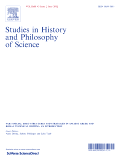
STUDIES IN HISTORY AND PHILOSOPHY OF SCIENCE
Fostering Insightful Dialogues on Science's Philosophical FoundationsSTUDIES IN HISTORY AND PHILOSOPHY OF SCIENCE, published by Elsevier Science Ltd, is a leading academic journal dedicated to the exploration of historical and philosophical dimensions of science. With both an ISSN of 0039-3681 and E-ISSN of 1879-2510, this esteemed journal has established itself as a pivotal resource since its inception in 1970 and continues to publish cutting-edge research reflecting the evolution of scientific thought. Situated in the United Kingdom, it is recognized for its high-impact contributions, boasting a Q1 ranking in both History and History and Philosophy of Science categories as of 2023. Researchers in the humanities will benefit from the journal’s rigorous analysis and insightful discussions, as evidenced by its competitive Scopus rankings—placing it in the 96th and 83rd percentiles in their respective fields. Although not an open-access journal, it maintains a commitment to scholarly excellence, aiming to foster a deeper understanding of the interconnections between historical context and philosophical inquiry in the scientific domain, making it an invaluable resource for students, professionals, and researchers alike.
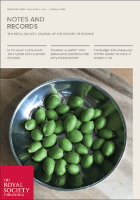
Notes and Records-The Royal Society Journal of the History of Science
Connecting History with Modern Scientific DiscourseNotes and Records - The Royal Society Journal of the History of Science is an esteemed scholarly journal published by the Royal Society in the United Kingdom, focusing on the historical aspects of science and its impact on modern scientific practices. With an ISSN of 0035-9149 and E-ISSN 1743-0178, this journal serves as a vital platform for researchers, professionals, and students who seek to explore the intricate connections between historical developments and contemporary scientific discourse. Recognized for its academic rigor, it holds a commendable position in the Q3 category of the History and Philosophy of Science field, ranking #56 out of 223 according to Scopus, and showcasing a 75th percentile ranking. Covering converged years from 1970 to 1973 and from 1975 to 2024, the journal publishes articles that contribute significantly to the understanding of the evolution of scientific thought. While it currently does not operate under an open access model, its esteemed content continues to engage a broad readership, fostering a deeper appreciation for the history behind scientific innovation and inquiry.

Spontaneous Generations-Journal for the History and Philosophy of Science
Exploring the Intersection of Science, History, and PhilosophySpontaneous Generations: Journal for the History and Philosophy of Science is a dedicated publication focusing on the rich fields of history and philosophy within the scientific domain. Published by the Institute for the History and Philosophy of Science and Technology, this journal provides a vital platform for scholars, researchers, and students to explore and disseminate ideas that bridge the historical context and philosophical inquiries of scientific practices. With its commitment to open access, Spontaneous Generations ensures that groundbreaking research is widely available, fostering an environment of collaboration and knowledge sharing. Aiming to engage a diverse audience, this journal is pivotal for those looking to understand the evolution of scientific thought and its implications on contemporary issues, making it an essential resource in the academic community.
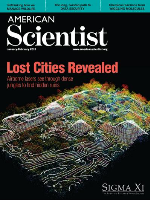
AMERICAN SCIENTIST
Engaging Minds in the Pursuit of Scientific Excellence.AMERICAN SCIENTIST is a prestigious multidisciplinary journal published by SIGMA XI-SCI RES SOC, renowned for its commitment to disseminating high-quality scientific research and insights since its inception in 1946. With an ISSN of 0003-0996 and an E-ISSN of 1545-2786, this journal serves as a valuable resource for researchers, professionals, and students alike, seeking to engage with current scientific discussions across various disciplines. Though it is not an Open Access journal, its articles are well-regarded in the academic community, evidenced by its Scopus ranking, placing it in the top 80th percentile among 88 multidisciplinary journals. Covering a wide range of topics, AMERICAN SCIENTIST aims to bridge the gap between science and the public by providing accessible writing that encourages informed dialogue around scientific advancement. With its extensive historical range from 1946 to 2016, it continues to be a critical platform for the exchange of innovative ideas and research findings that shape the future of science.